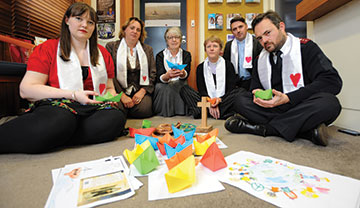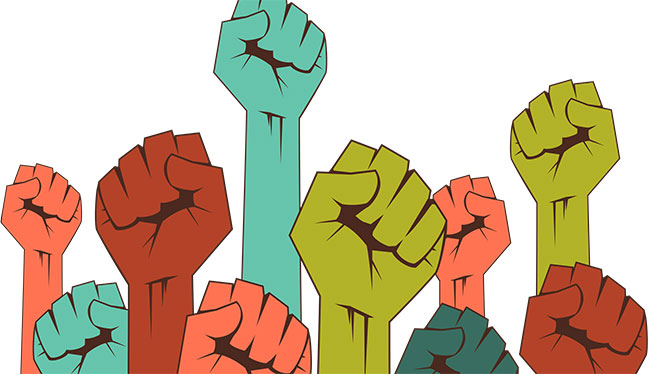DEAR AMY,
I recently read about an Australian officer, Captain Craig Farrell, who was arrested, along with five other church leaders and members, for occupying a government official's office to protest the detention of hundreds of children of asylum seekers. Farrell said they staged a peaceful sit-in, during which they asked the minister to “push for Labor [the ruling party] to change its policy” toward holding children in detention centres and adopt a more compassionate approach to dealing with refugees.
 Church leaders in Australia, including Salvation Army Cpt Craig Farrell, occupy the office of a federal MP to protest the treatment of asylum seekers (Photo: Leanne Kelly, courtesy of Geelong Advertiser)
Church leaders in Australia, including Salvation Army Cpt Craig Farrell, occupy the office of a federal MP to protest the treatment of asylum seekers (Photo: Leanne Kelly, courtesy of Geelong Advertiser)
The other ministers wore their official collars, the captain his Army uniform. At the end of the day, they were arrested for refusing to vacate the office, spent a few hours in jail and were then freed on bail. Shortly after, each was found guilty and fined $200. Someone passed a collection plate around the packed courthouse, from which their fines were paid.
My reaction to this news was mixed. As a former territorial leader, I would have been mortified if one of my officers or employees had flaunted the law in full Salvation Army uniform, bringing disrepute on our beloved organization and potentially impacting donations or government funding for our other projects. And the resulting criminal record could limit their options in future appointments. In addition, this activity smacks of party politics, which is anathema to the Army as an apolitical organization.
However, my initial mortification was tempered by memories of our time in South Africa, where we served for seven years in the immediate post-apartheid era. A major victory for justice had been won, symbolized by the election of Nelson Mandela as president following the country's first free and fair election. The church was acknowledged as having been complicit in apartheid, but also helpful in the struggle for justice.
The Salvation Army contributed to mitigating some of the excesses of apartheid. A Canadian was responsible for integrating the African and European training colleges, despite this action being illegal at the time. Following the end of apartheid, our leadership was one of the first religious organizations to make a submission to the Truth and Reconciliation Commission. The Salvation Army, then led by Commissioner (Dr.) Paul du Plessis, essentially admitted that we should have done more, and that we abused our apolitical stance by using it as “an excuse for silence when we should be prepared to speak prophetically and fearlessly on matters of injustice.” He followed by saying, “With people of all kinds of political persuasion in our ranks, we chose to remain silent, a sin of omission which we deeply regret.”
Fortunately, the Australian officer received permission from territorial headquarters to participate in the protest. But what if permission wasn't forthcoming despite the urgent need to correct an injustice? I suggest that civil disobedience is acceptable as a final resort in the pursuit of justice, particularly on behalf of specific groups or minorities that are systematically marginalized or persecuted. The targets could be direct public policy, in the case of the apartheid system, or a system incapable of dealing with the challenge of minorities, such as the treatment of an aboriginal population or a sudden influx of undocumented refugees.
My position is that when justice is finally achieved, those who benefit will remember their friends in the struggle. When a soldier or officer risks arrest, or worse, while wearing the Salvation Army uniform, it will be remembered when justice is achieved. If we want to be seen as advocates for social justice and the friend of the marginalized, we must make some provision in our regulations and policies for the Captain Farrells of the organization to take a risk when the occasion demands it.
Does the Holy Spirit sometimes call Salvationists to civil disobedience, or does this just hurt our Christian witness?
BOB
DEAR BOB,
On one hand, I see it as a positive thing that Salvationists are protesting injustice and doing it in uniform. After all, our movement began as a response to injustice. I always tell non-Salvationists that I wear the uniform to represent being at war with poverty, sin and injustice. What are we, if not warriors for the good?
On the other hand, I am not convinced that our engagement with these issues should begin with civil disobedience. While we are on the front lines spiritually, I am not sure we should be on the front lines politically. As people of God and not politically driven militants, it may not address our larger mission if we pick particular issues and go on the attack.
One of the lovely things about the Army is that we are present wherever people have been hurt and victimized. If we spend our energy in civil disobedience, we may have to abandon our role as the quiet angels who reach out with arms of love to the disenfranchised. Political issues affect people, obviously. But we may have to choose whether we fight for the issues or serve the actual people.
Our resources are not unlimited. Maybe it is best for us to concentrate on serving human beings and leave the political battles to others.
I am also concerned that uniformed Salvationists might jump on the bandwagon of an issue without fully understanding the possible far-reaching repercussions. What one Salvationist says or does in one place can be trumpeted by uninformed, slanderous people as the position of the Army worldwide, causing considerable trouble for the Army in other parts of the world. Even making particular affiliations in a local community could start ripples that become tsunamis elsewhere.
Having said that, there have been large, world-changing political campaigns that should have involved every Christian movement: the struggle against slavery, the civil rights movement in the United States, the ending of apartheid. But who gets to decide what those major campaigns are? What may seem like an obvious, unbending Christian principle to one person may not seem the same to another. I guess that's where the Army's structure of authority comes in.
AMY
DEAR AMY,
I see you understand the dilemma leaders face when trying to determine how far to go publicly in the fight for justice. I am sure that every leader, at the time, feels they are making the correct decision and preserving the good name of The Salvation Army. Allowing people on both sides of a controversial issue to determine their own involvement as private individuals is consistent with the Army's apolitical stance. We can't know when people are being led by the Holy Spirit. At the same time, we can continue to work with policy makers while engaging in other, less provocative advocacy measures.
But I have to ask where we might have fallen short in the cause for justice. Could the initiative to integrate racially segregated training colleges, or the case of the Australian officer granted permission to deliberately defy the authorities, give us a model we need to take more seriously? If so, who should form our pool of “designated hitters” or sacrificial lambs? We could choose Salvation Army officers or public relations representatives—or do we hand the responsibility over to more idealistic, mission-minded young people such as we find at The War College or Booth University College?
Civil disobedience should not be our first recourse. But organizationally sanctioned disobedience to unjust laws should be part of our strategic arsenal, and we should be prepared to support individuals and groups within the organization who have defied authority or powerful organizations in a just cause.
BOB
DEAR BOB,
Yes, the Army allows its people to decide privately where they fall on controversial issues. But would the Holy Spirit lead two people in opposite directions? Imagine if one Salvationist felt led to protest racial segregation, but another was convinced that segregation was part of God's natural order. Today, we understand that any spiritual defence of racism would be absurd, but people haven't always been so enlightened. Indeed, there are probably current issues we think we understand, but in the future we'll look back and shake our heads at our ignorance.
You ask who would form our pool of “designated hitters.” Before we tackle that question, we should ask if our leaders need to give stronger guidance about the appropriate Christian response to the issues facing our society. I don't want corps officers telling their soldiers which candidate to support in an election. But if Salvationists find themselves on opposing sides of an issue that is both political and moral, that signals to me that somebody is misinterpreting Scripture or the guidance of the Holy Spirit. As I understand biblical church structure, we—especially leaders—have the responsibility of taking each other to task.
My final thought is this: In all we do, we represent Christ—whether in uniform or not. Of this, we must be constantly mindful.
AMY










1 Peter 3:17 said: "For it is better to suffer for doing good, if that should be God’s will, than for doing evil."